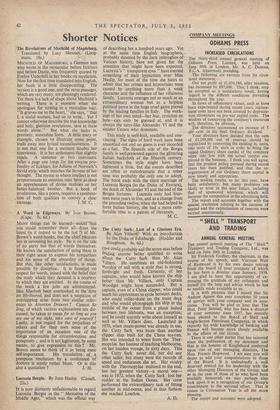Shorter Notices
MECHTILD OF MAGDEBURG, a German nun who wrote in the vernacular before Eckhart and before Dante, was frequently quoted by Evelyn Underhill in her books on mysticism. Now for the first time translated into English, her book is a little disappointing. The version is a good one, and the verse passages, which are very many, are pleasingly rendered. Yet there is a lack of shape about Mechtild's writing. There is a moment when she apologises for writing in a masculine way. "It grieves me to the heart," she says, "that I, a sinful woman, had so to write. Yet I cannot otherwise describe the true knowledge and holy, glorious revelations, save in these words alone." But what she lacks is, precisely, masculine form. A little story or example, chosen to illustrate some point, trails away into lyrical inconclusiveness. It is not that one for a moment doubts her experience. It is her artlessness that slightly repels. A sentence or two convinces. After a page one longs for the concise pro- fundity of Eckhart, for Juliana of Norwich's fervid style, which matches the fervour of her thought. The mystic in whom intellect is not proportionate to emotion may have as deep an apprehension of divine realities as her better-balanced brother. But a book of revelations, like a poem, requires a combina- tion of both qualities to convey a clear


























































 Previous page
Previous page